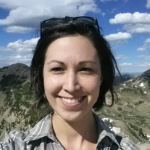Dr. Amanda Pierce
PhD in PBEE, Emory University, 2010-2015
Current postdoc at UNC-Chapel Hill
http://pierceresearch.weebly.com
PSW: When did you begin making moves towards a post-doc position (i.e. talking with potential mentors, researching grant funding, etc.)?
AAP: Since I was involved in the seminar committee, I was able to invite one person per semester that I thought could be a potential post-doc mentor and I started inviting people back in 2013, so I guess I was making moves back in my 3rd year. I got serious about looking into funding my 4th year and actually applied for funding my 5th year. I applied for an NSF postdoc fellowship with Marcus Kronforst and I applied for the SPIRE program at UNC with Karin Pfennig. SPIRE is a 3 year program and part of IRACDA (the same people that do FIRST at Emory) and focuses on both research and teaching.
[SPIRE stands for Seeding Postdoctoral Innovators in Research & Education. It currently funds post-docs at UNC-Chapel Hill (the lead institution) and 4 other state universities in North Carolina. It is funded by the NIH. For more information: http://spire.unc.edu/ ]
PSW: When determining a mentor, was it someone you already knew personally through a colleague or a conference, or did you cold call/e-mail someone?
AAP: The nice thing about the seminar invites is that potential mentors were forced to spend a day or two with me while they were visiting Emory so I got to know them that way. Typically the people I invited to seminar were cold-email, but some of them I knew through colleagues/collaboration.
PSW: Did you have in mind multiple places when you considered a post-doc or did you know from the beginning one school or mentor that you wanted to work with?
AAP: During my 5th year it was between Marcus Kronforst at the University of Chicago and Karin Pfennig at UNC. Ultimately I thought Karin would be a better fit for me and my research, and I found out I got funding and was happy to make a decision already.
PSW: How far in advance did you apply for funding? What was the timeline as far as defending, applying for funding, and moving/beginning a postdoc?
AAP: The NSF was due early January and SPIRE was due February 1st. The SPIRE deadline is only once a year and they let you know relatively quickly but NSF has multiple [deadlines] and in retrospect I should have applied the previous Fall. I found out about NSF results in July (when I defended), so if that were my last option that would have been really stressful. I defended in July, moved in August, and began my postdoc September 1st.
PSW: What made you choose the school that you did? What skills or experiences are you looking to gain from your post-doc?
AAP: UNC/the research triangle area is full of scientists doing work that I think is really cool/interesting. I really hope to take advantage of this and form some collaborations before I leave. Specifically, about the SPIRE program, I liked that there was going to be guidance on how to teach. I TA’d a couple times in grad school but with SPIRE they actually teach you how to develop a course/make a syllabus/stuff like that, and I felt like those were valuable skills.
PSW: How did your experiences in PBEE help you gain skills needed for your post-doc? What do you wish you had known or done before becoming a post-doc?
AAP: So far being a postdoc definitely requires more independence than being a graduate student, but I think that is to be expected. Aside from technical skills (molecular lab/computer stuff), I think what graduate school taught me the most was to be able to identify and solve problems independently.
PSW: How long (ideally) do you plan on being a post-doc? What are your ultimate career goals?
AAP: My current position is 3 years and it would be awesome to get a job immediately after that…but I would also consider another short post-doc. At this point my goal is a tenure-track position but I’m not sure if I would prefer an R1 institution of a liberal arts college (that’s also what I hope SPIRE will help me figure out).
PSW: Any other thoughts on being a post-doc or advice to current graduate students on the way to postdoc-ing?
AAP: I think in terms of picking a lab the same things apply now as they did when we were deciding on grad school – what is the PI’s track record like? Are the current students happy? Where did the former students end up? If possible, get on the seminar committee and try to invite potential post-doc mentors!! It’s the easiest way to force people to hang out with you (haha).

